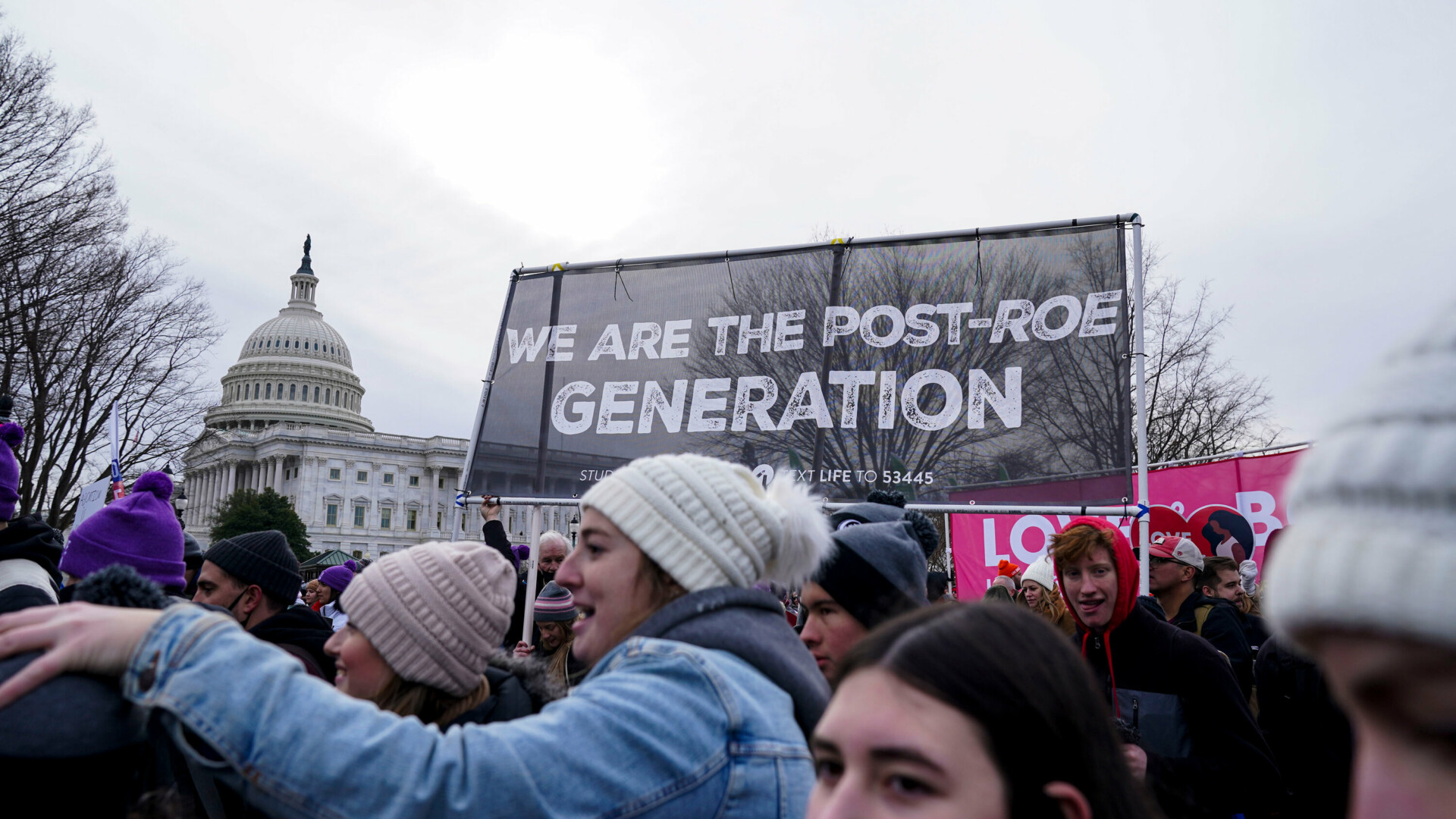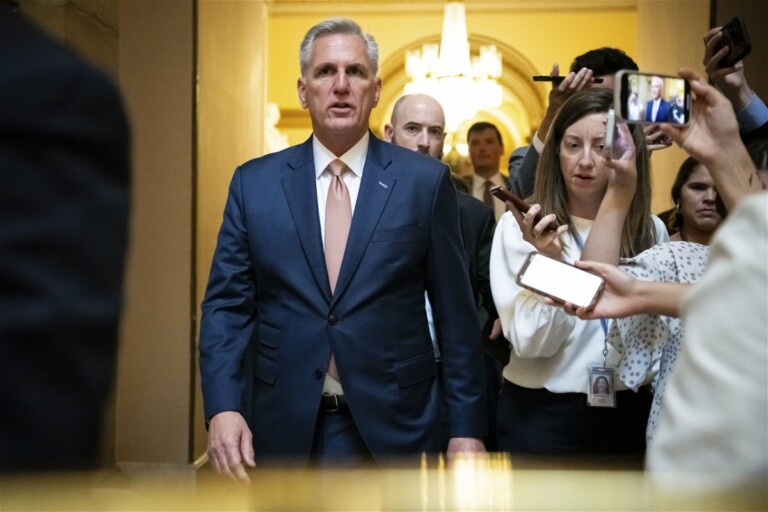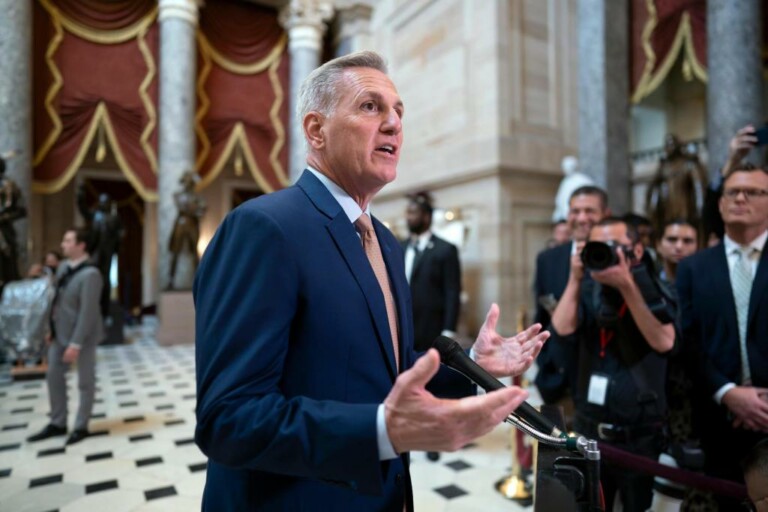Republican presidential candidates have been one-upping each other on abortion limits and bans, with participants in this week’s GOP primary debate vowing to sign a federal ban on the procedure.
The Democrats’ response has been to bury Republicans with their own words, including with a national ad the Biden-Harris campaign released Friday featuring clips of former President Donald Trump, Florida Gov. Ron DeSantis and Sen. Tim Scott of South Carolina pledging to stop abortion – by punishing women who have one, in Trump’s case.
Since the 2022 Supreme Court decision taking away guaranteed abortion rights, both parties have elevated the issue in their campaigns. And both think it will be a winner for them in 2024.
“These guys showed us this week they don’t have a clue about the power of women,” President Joe Biden said on social media, releasing his and Vice President Kamala Harris’ new ad. “They are about to find out.”
The campaign is spending $25 million to run the ad online and in the battleground states of Arizona, Georgia, Michigan, Nevada, North Carolina, Pennsylvania and Wisconsin.
Democrats overwhelmingly back abortion rights, surveys show: A Gallup poll this year found that just 4% of Democrats want to ban abortion in all circumstances.
Former Vice President Mike Pence, meanwhile, said during Wednesday night’s debate in Milwaukee that he is a “champion for life” who would sign a ban on abortion after 15 weeks. When Nikki Haley, a former U.S. ambassador who also opposes abortion, countered that the votes aren’t there in the Senate to overcome a filibuster, Pence shot back, saying, “Consensus is the opposite of leadership.”
DeSantis, meanwhile, bragged about his signing of a six-week abortion ban in Florida, while Scott said he would back the 15-week ban. In April, Scott said in an interview with NBC News that he would sign “the most conservative, pro-life” legislation into law.”
That’s an approach that plays very well with the GOP primary electorate, which largely opposes abortion. A recent CBS/YouGov poll found that 68% of Republican voters think abortion should be illegal in all or most cases.
And Republicans – like Democrats – aren’t shying away from the issue.
“I was very pleased to see them talk about abortion,” RNC Chairwoman Ronna McDaniel told Fox News the morning after the debate. “Democrats used that in 2022. … If our candidates aren’t able to fend a response and put out a response, we’re not going to win. They’re going to do it again in 2024. And I thought all of them did a really good job on that.”
But since the June 2022 ruling Dobbs v. Jackson Women’s Health Organization, the pro-abortion rights side has become newly energized. While anti-abortion forces have had success in the courts (the South Carolina state Supreme Court this week upheld a near-total ban on abortion), abortion foes have been losing consistently when the matter is put directly before voters – a troubling trend for anti-abortion forces ahead of what is expected to be a highly competitive 2024 election.
Since Dobbs, voters in California, Michigan and Vermont approved referendums to enshrine abortion rights in the state constitutions, unsurprising for three states where Democrats are in control. But in three red states – Kansas, Kentucky and Montana – measures to reject guaranteed abortion rights were defeated.
Further, Ohio voters overwhelmingly this month rejected a measure that would require a supermajority of 60% to pass a state constitutional amendment. That means abortion rights advocates will have a much easier time winning a referendum on the ballot this fall to ensure abortion rights. Polling shows strong support for that measure.
More problematic for Republicans going forward – at least from an electoral perspective – is a slate of referendums proposed for 2024 state ballots. In Arizona, Florida, Maryland, Missouri, New York and South Dakota, advocates are pushing for votes to protect reproductive rights. Abortion foes are trying to get referendums on the ballot in Iowa, Nebraska and Pennsylvania to prohibit abortion or to state clearly that the state constitution does not guarantee the right to abortion.
The fate of those ballot initiatives (should activists indeed get the signatures required to get them on the ballot) may be secondary to another factor: voter turnout.
In Arizona, a state Biden won by a razor-thin 10,457 votes, the referendum could spur pro-abortion rights voters to go to the polls – perhaps providing a critical difference for an incumbent president who, polling indicates, does not inspire excitement among Democrats. The same may well be true in Pennsylvania, a state Biden won by 81,660 votes – about 0.2% of the voting electorate.
“I think what we’ve seen here is across partisan lines, in red, blue and purple states, voters have made themselves clear – they want to protect reproductive freedom,” says Ally Boguhn, spokesperson for NARAL Pro-Choice America. “I do think we’re going to continue to see this as something that will drive them to the polls.”
Republicans argue that forging ahead with abortion bans, taking advantage of the free-for-all created by the Dobbs ruling, will motivate their voters as well.
Cindy Dahlgren, a spokesperson for the Center for Arizona Policy, which opposes the referendum enshrining abortion rights, says there will be “plenty of reasons turnout will be high in 2024,” including inflation and the fact that it is a presidential year.
The proposed Arizona referendum, she says, goes too far.
“It would make regulating abortion virtually impossible and that is not where Arizonans are on abortion and why abortion law should be set by lawmakers who can make changes to the law as needed,” Dahlgren says.
But polling indicates that Democrats have an edge on motivating their voters around the abortion issue.
A Kaiser Family Foundation survey in May found that 30% of voters will cast a ballot only for a candidate who agrees with them on abortion. Broken down, that includes 46% of Democrats, 23% of independents, and 20% of Republicans, suggesting Democrats are more likely to make abortion rights a litmus test issue.
Further, Democrats have an edge among self-described independents in the poll, with 36% of independents saying Democrats more closely represented their views on abortion and 13% saying Republicans’ views on the issue were closer to their own.
Mary Owens, communications director for SBA Pro-Life America, says the anti-abortion movement needs to learn the lessons from Ohio to win next year.
“So far, in all of the state battles, our side has failed to take this approach, allowing the left and pro-abortion industry and allies to define the effort,” Owens says. “We must define the issues at stake early and often with a simple message.”







